Insurance Law Case Study: Chen's Insurance Claim Analysis
VerifiedAdded on 2022/10/10
|7
|1594
|166
Case Study
AI Summary
This case study examines a travel insurance claim scenario involving Chen, who was injured during his travels. The analysis delves into various legal issues, including the likelihood of Chen succeeding in claiming medical expenses, the impact of pre-existing conditions, and the implications of negligence. The study considers relevant Australian legislation such as the Insurance Act 1973, the Insurance Contracts Act 1984, and the Insurance Contracts Regulation 2017. The analysis applies these laws to the facts of Chen's case, considering issues such as the failure to wear a helmet, the non-disclosure of a pre-existing condition, and the loss of personal belongings due to negligence. Furthermore, the case study addresses complaint resolution mechanisms available to Chen if he is unhappy with the outcome of his claim. The conclusion provides an assessment of the likely outcomes for each of the issues raised, referencing relevant case law and legislation.
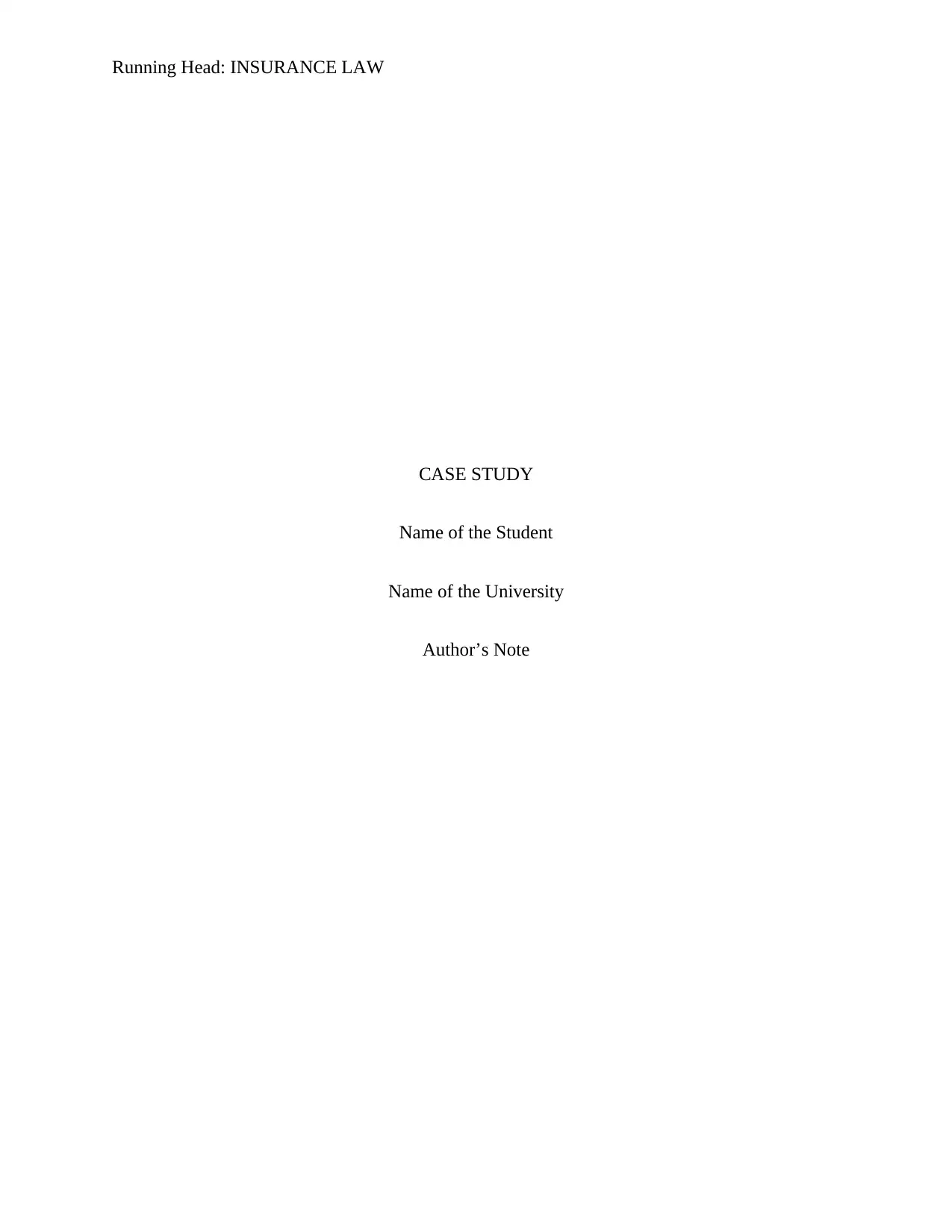
Running Head: INSURANCE LAW
CASE STUDY
Name of the Student
Name of the University
Author’s Note
CASE STUDY
Name of the Student
Name of the University
Author’s Note
Paraphrase This Document
Need a fresh take? Get an instant paraphrase of this document with our AI Paraphraser
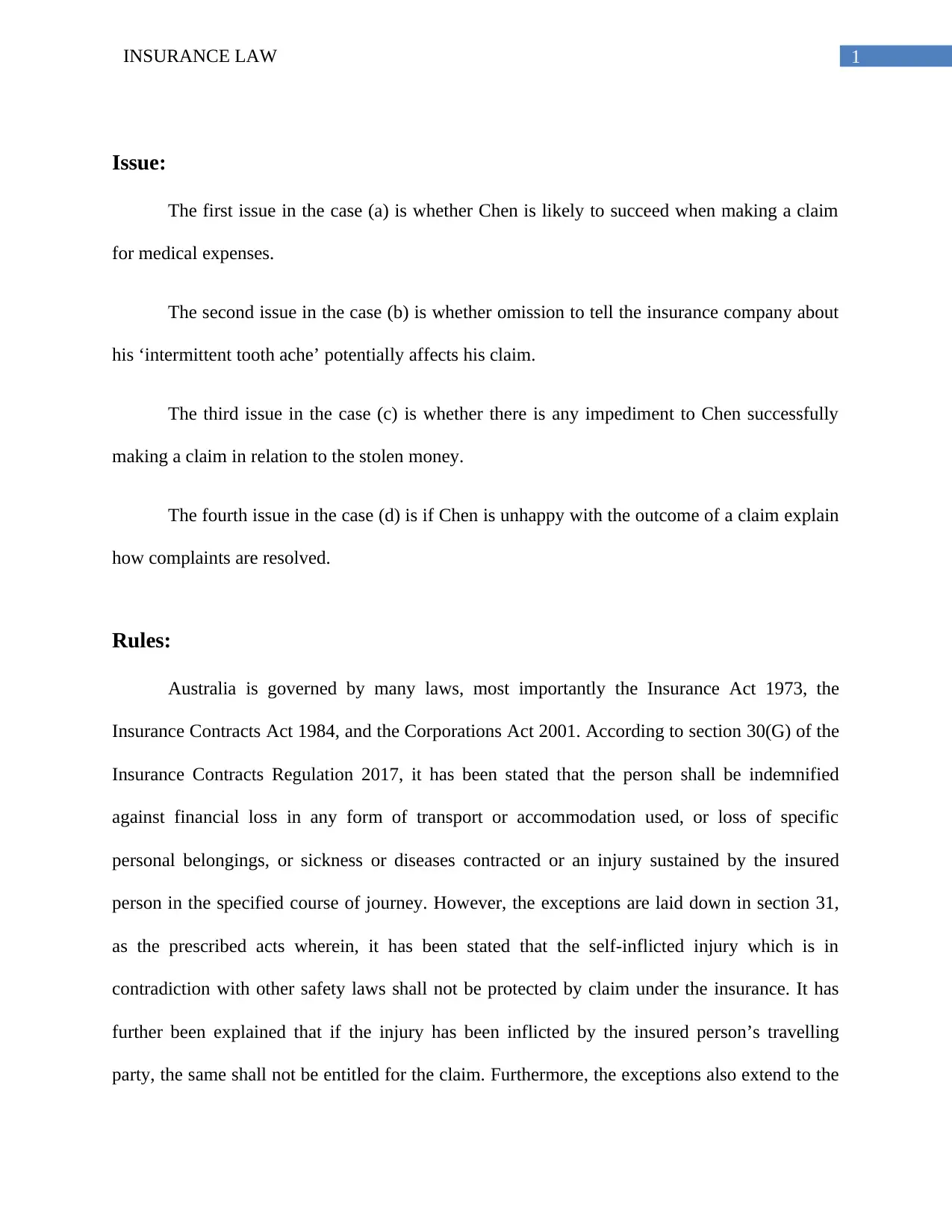
1INSURANCE LAW
Issue:
The first issue in the case (a) is whether Chen is likely to succeed when making a claim
for medical expenses.
The second issue in the case (b) is whether omission to tell the insurance company about
his ‘intermittent tooth ache’ potentially affects his claim.
The third issue in the case (c) is whether there is any impediment to Chen successfully
making a claim in relation to the stolen money.
The fourth issue in the case (d) is if Chen is unhappy with the outcome of a claim explain
how complaints are resolved.
Rules:
Australia is governed by many laws, most importantly the Insurance Act 1973, the
Insurance Contracts Act 1984, and the Corporations Act 2001. According to section 30(G) of the
Insurance Contracts Regulation 2017, it has been stated that the person shall be indemnified
against financial loss in any form of transport or accommodation used, or loss of specific
personal belongings, or sickness or diseases contracted or an injury sustained by the insured
person in the specified course of journey. However, the exceptions are laid down in section 31,
as the prescribed acts wherein, it has been stated that the self-inflicted injury which is in
contradiction with other safety laws shall not be protected by claim under the insurance. It has
further been explained that if the injury has been inflicted by the insured person’s travelling
party, the same shall not be entitled for the claim. Furthermore, the exceptions also extend to the
Issue:
The first issue in the case (a) is whether Chen is likely to succeed when making a claim
for medical expenses.
The second issue in the case (b) is whether omission to tell the insurance company about
his ‘intermittent tooth ache’ potentially affects his claim.
The third issue in the case (c) is whether there is any impediment to Chen successfully
making a claim in relation to the stolen money.
The fourth issue in the case (d) is if Chen is unhappy with the outcome of a claim explain
how complaints are resolved.
Rules:
Australia is governed by many laws, most importantly the Insurance Act 1973, the
Insurance Contracts Act 1984, and the Corporations Act 2001. According to section 30(G) of the
Insurance Contracts Regulation 2017, it has been stated that the person shall be indemnified
against financial loss in any form of transport or accommodation used, or loss of specific
personal belongings, or sickness or diseases contracted or an injury sustained by the insured
person in the specified course of journey. However, the exceptions are laid down in section 31,
as the prescribed acts wherein, it has been stated that the self-inflicted injury which is in
contradiction with other safety laws shall not be protected by claim under the insurance. It has
further been explained that if the injury has been inflicted by the insured person’s travelling
party, the same shall not be entitled for the claim. Furthermore, the exceptions also extend to the
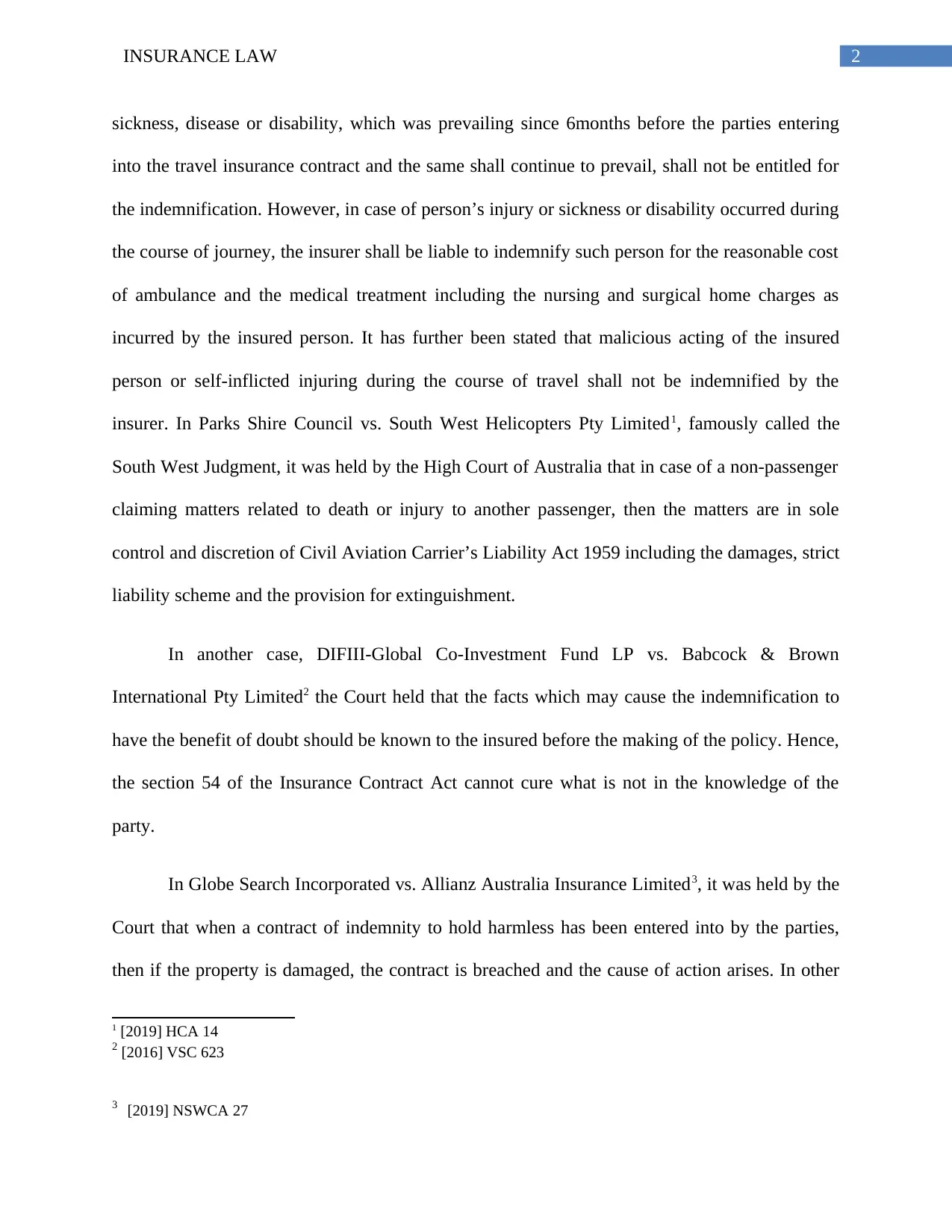
2INSURANCE LAW
sickness, disease or disability, which was prevailing since 6months before the parties entering
into the travel insurance contract and the same shall continue to prevail, shall not be entitled for
the indemnification. However, in case of person’s injury or sickness or disability occurred during
the course of journey, the insurer shall be liable to indemnify such person for the reasonable cost
of ambulance and the medical treatment including the nursing and surgical home charges as
incurred by the insured person. It has further been stated that malicious acting of the insured
person or self-inflicted injuring during the course of travel shall not be indemnified by the
insurer. In Parks Shire Council vs. South West Helicopters Pty Limited1, famously called the
South West Judgment, it was held by the High Court of Australia that in case of a non-passenger
claiming matters related to death or injury to another passenger, then the matters are in sole
control and discretion of Civil Aviation Carrier’s Liability Act 1959 including the damages, strict
liability scheme and the provision for extinguishment.
In another case, DIFIII-Global Co-Investment Fund LP vs. Babcock & Brown
International Pty Limited2 the Court held that the facts which may cause the indemnification to
have the benefit of doubt should be known to the insured before the making of the policy. Hence,
the section 54 of the Insurance Contract Act cannot cure what is not in the knowledge of the
party.
In Globe Search Incorporated vs. Allianz Australia Insurance Limited3, it was held by the
Court that when a contract of indemnity to hold harmless has been entered into by the parties,
then if the property is damaged, the contract is breached and the cause of action arises. In other
1 [2019] HCA 14
2 [2016] VSC 623
3 [2019] NSWCA 27
sickness, disease or disability, which was prevailing since 6months before the parties entering
into the travel insurance contract and the same shall continue to prevail, shall not be entitled for
the indemnification. However, in case of person’s injury or sickness or disability occurred during
the course of journey, the insurer shall be liable to indemnify such person for the reasonable cost
of ambulance and the medical treatment including the nursing and surgical home charges as
incurred by the insured person. It has further been stated that malicious acting of the insured
person or self-inflicted injuring during the course of travel shall not be indemnified by the
insurer. In Parks Shire Council vs. South West Helicopters Pty Limited1, famously called the
South West Judgment, it was held by the High Court of Australia that in case of a non-passenger
claiming matters related to death or injury to another passenger, then the matters are in sole
control and discretion of Civil Aviation Carrier’s Liability Act 1959 including the damages, strict
liability scheme and the provision for extinguishment.
In another case, DIFIII-Global Co-Investment Fund LP vs. Babcock & Brown
International Pty Limited2 the Court held that the facts which may cause the indemnification to
have the benefit of doubt should be known to the insured before the making of the policy. Hence,
the section 54 of the Insurance Contract Act cannot cure what is not in the knowledge of the
party.
In Globe Search Incorporated vs. Allianz Australia Insurance Limited3, it was held by the
Court that when a contract of indemnity to hold harmless has been entered into by the parties,
then if the property is damaged, the contract is breached and the cause of action arises. In other
1 [2019] HCA 14
2 [2016] VSC 623
3 [2019] NSWCA 27
⊘ This is a preview!⊘
Do you want full access?
Subscribe today to unlock all pages.

Trusted by 1+ million students worldwide
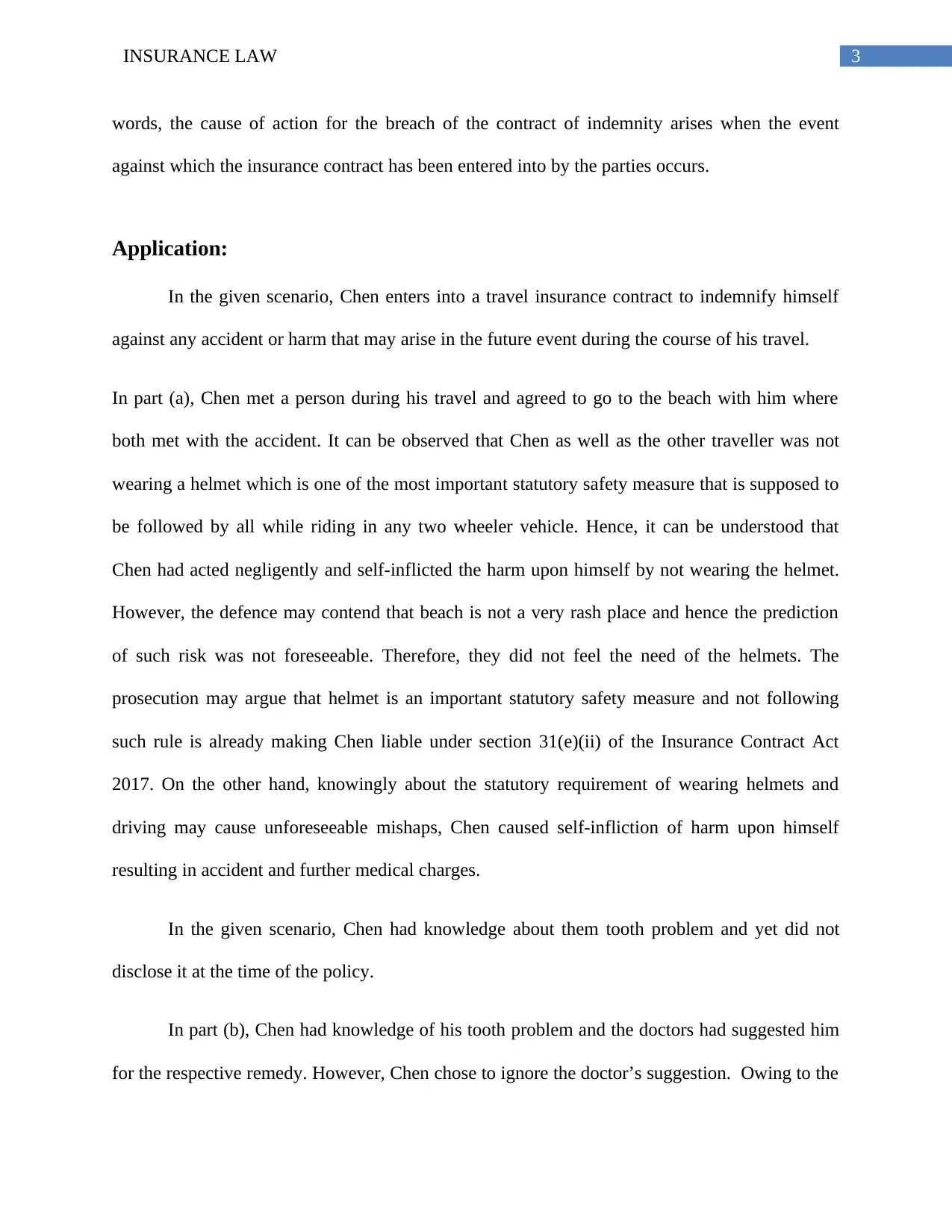
3INSURANCE LAW
words, the cause of action for the breach of the contract of indemnity arises when the event
against which the insurance contract has been entered into by the parties occurs.
Application:
In the given scenario, Chen enters into a travel insurance contract to indemnify himself
against any accident or harm that may arise in the future event during the course of his travel.
In part (a), Chen met a person during his travel and agreed to go to the beach with him where
both met with the accident. It can be observed that Chen as well as the other traveller was not
wearing a helmet which is one of the most important statutory safety measure that is supposed to
be followed by all while riding in any two wheeler vehicle. Hence, it can be understood that
Chen had acted negligently and self-inflicted the harm upon himself by not wearing the helmet.
However, the defence may contend that beach is not a very rash place and hence the prediction
of such risk was not foreseeable. Therefore, they did not feel the need of the helmets. The
prosecution may argue that helmet is an important statutory safety measure and not following
such rule is already making Chen liable under section 31(e)(ii) of the Insurance Contract Act
2017. On the other hand, knowingly about the statutory requirement of wearing helmets and
driving may cause unforeseeable mishaps, Chen caused self-infliction of harm upon himself
resulting in accident and further medical charges.
In the given scenario, Chen had knowledge about them tooth problem and yet did not
disclose it at the time of the policy.
In part (b), Chen had knowledge of his tooth problem and the doctors had suggested him
for the respective remedy. However, Chen chose to ignore the doctor’s suggestion. Owing to the
words, the cause of action for the breach of the contract of indemnity arises when the event
against which the insurance contract has been entered into by the parties occurs.
Application:
In the given scenario, Chen enters into a travel insurance contract to indemnify himself
against any accident or harm that may arise in the future event during the course of his travel.
In part (a), Chen met a person during his travel and agreed to go to the beach with him where
both met with the accident. It can be observed that Chen as well as the other traveller was not
wearing a helmet which is one of the most important statutory safety measure that is supposed to
be followed by all while riding in any two wheeler vehicle. Hence, it can be understood that
Chen had acted negligently and self-inflicted the harm upon himself by not wearing the helmet.
However, the defence may contend that beach is not a very rash place and hence the prediction
of such risk was not foreseeable. Therefore, they did not feel the need of the helmets. The
prosecution may argue that helmet is an important statutory safety measure and not following
such rule is already making Chen liable under section 31(e)(ii) of the Insurance Contract Act
2017. On the other hand, knowingly about the statutory requirement of wearing helmets and
driving may cause unforeseeable mishaps, Chen caused self-infliction of harm upon himself
resulting in accident and further medical charges.
In the given scenario, Chen had knowledge about them tooth problem and yet did not
disclose it at the time of the policy.
In part (b), Chen had knowledge of his tooth problem and the doctors had suggested him
for the respective remedy. However, Chen chose to ignore the doctor’s suggestion. Owing to the
Paraphrase This Document
Need a fresh take? Get an instant paraphrase of this document with our AI Paraphraser
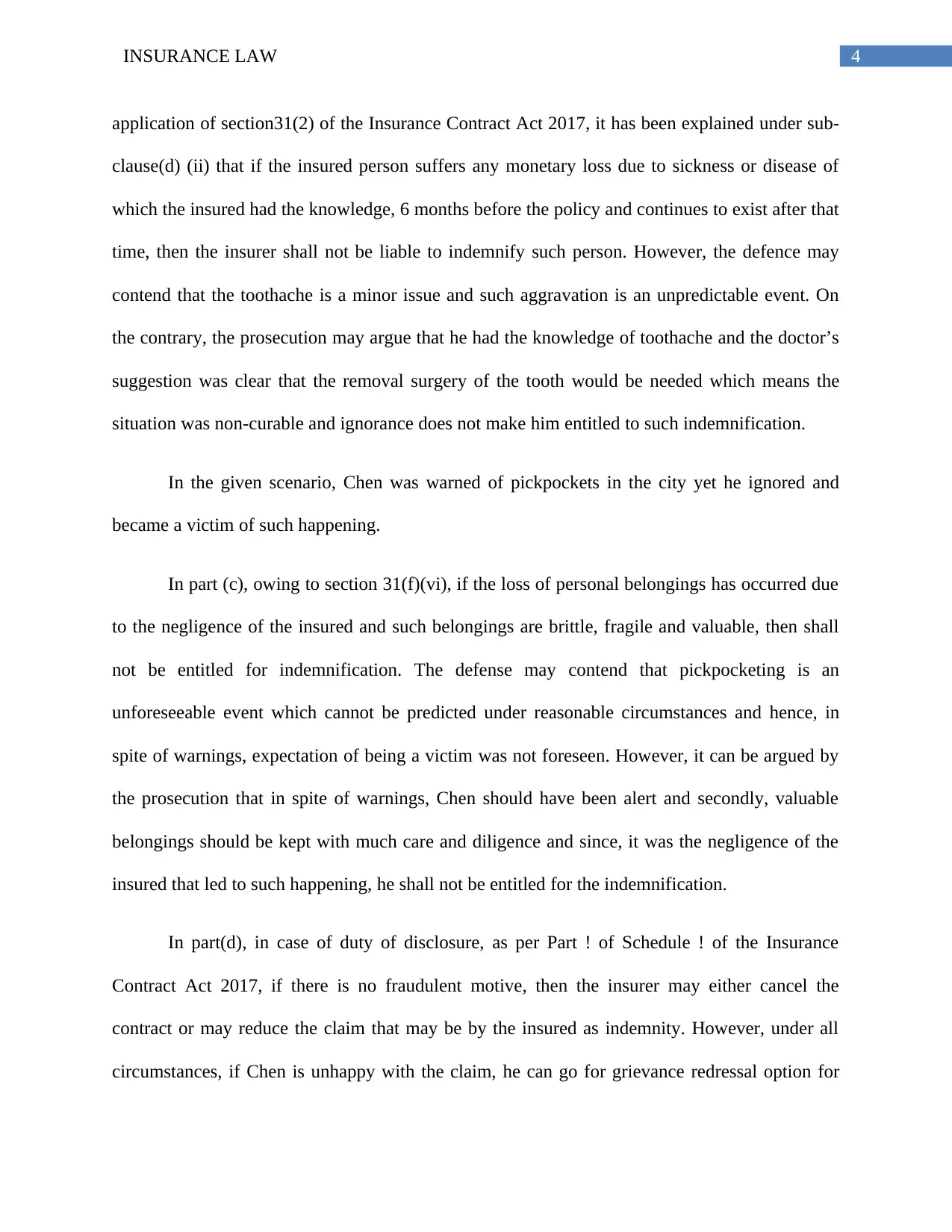
4INSURANCE LAW
application of section31(2) of the Insurance Contract Act 2017, it has been explained under sub-
clause(d) (ii) that if the insured person suffers any monetary loss due to sickness or disease of
which the insured had the knowledge, 6 months before the policy and continues to exist after that
time, then the insurer shall not be liable to indemnify such person. However, the defence may
contend that the toothache is a minor issue and such aggravation is an unpredictable event. On
the contrary, the prosecution may argue that he had the knowledge of toothache and the doctor’s
suggestion was clear that the removal surgery of the tooth would be needed which means the
situation was non-curable and ignorance does not make him entitled to such indemnification.
In the given scenario, Chen was warned of pickpockets in the city yet he ignored and
became a victim of such happening.
In part (c), owing to section 31(f)(vi), if the loss of personal belongings has occurred due
to the negligence of the insured and such belongings are brittle, fragile and valuable, then shall
not be entitled for indemnification. The defense may contend that pickpocketing is an
unforeseeable event which cannot be predicted under reasonable circumstances and hence, in
spite of warnings, expectation of being a victim was not foreseen. However, it can be argued by
the prosecution that in spite of warnings, Chen should have been alert and secondly, valuable
belongings should be kept with much care and diligence and since, it was the negligence of the
insured that led to such happening, he shall not be entitled for the indemnification.
In part(d), in case of duty of disclosure, as per Part ! of Schedule ! of the Insurance
Contract Act 2017, if there is no fraudulent motive, then the insurer may either cancel the
contract or may reduce the claim that may be by the insured as indemnity. However, under all
circumstances, if Chen is unhappy with the claim, he can go for grievance redressal option for
application of section31(2) of the Insurance Contract Act 2017, it has been explained under sub-
clause(d) (ii) that if the insured person suffers any monetary loss due to sickness or disease of
which the insured had the knowledge, 6 months before the policy and continues to exist after that
time, then the insurer shall not be liable to indemnify such person. However, the defence may
contend that the toothache is a minor issue and such aggravation is an unpredictable event. On
the contrary, the prosecution may argue that he had the knowledge of toothache and the doctor’s
suggestion was clear that the removal surgery of the tooth would be needed which means the
situation was non-curable and ignorance does not make him entitled to such indemnification.
In the given scenario, Chen was warned of pickpockets in the city yet he ignored and
became a victim of such happening.
In part (c), owing to section 31(f)(vi), if the loss of personal belongings has occurred due
to the negligence of the insured and such belongings are brittle, fragile and valuable, then shall
not be entitled for indemnification. The defense may contend that pickpocketing is an
unforeseeable event which cannot be predicted under reasonable circumstances and hence, in
spite of warnings, expectation of being a victim was not foreseen. However, it can be argued by
the prosecution that in spite of warnings, Chen should have been alert and secondly, valuable
belongings should be kept with much care and diligence and since, it was the negligence of the
insured that led to such happening, he shall not be entitled for the indemnification.
In part(d), in case of duty of disclosure, as per Part ! of Schedule ! of the Insurance
Contract Act 2017, if there is no fraudulent motive, then the insurer may either cancel the
contract or may reduce the claim that may be by the insured as indemnity. However, under all
circumstances, if Chen is unhappy with the claim, he can go for grievance redressal option for
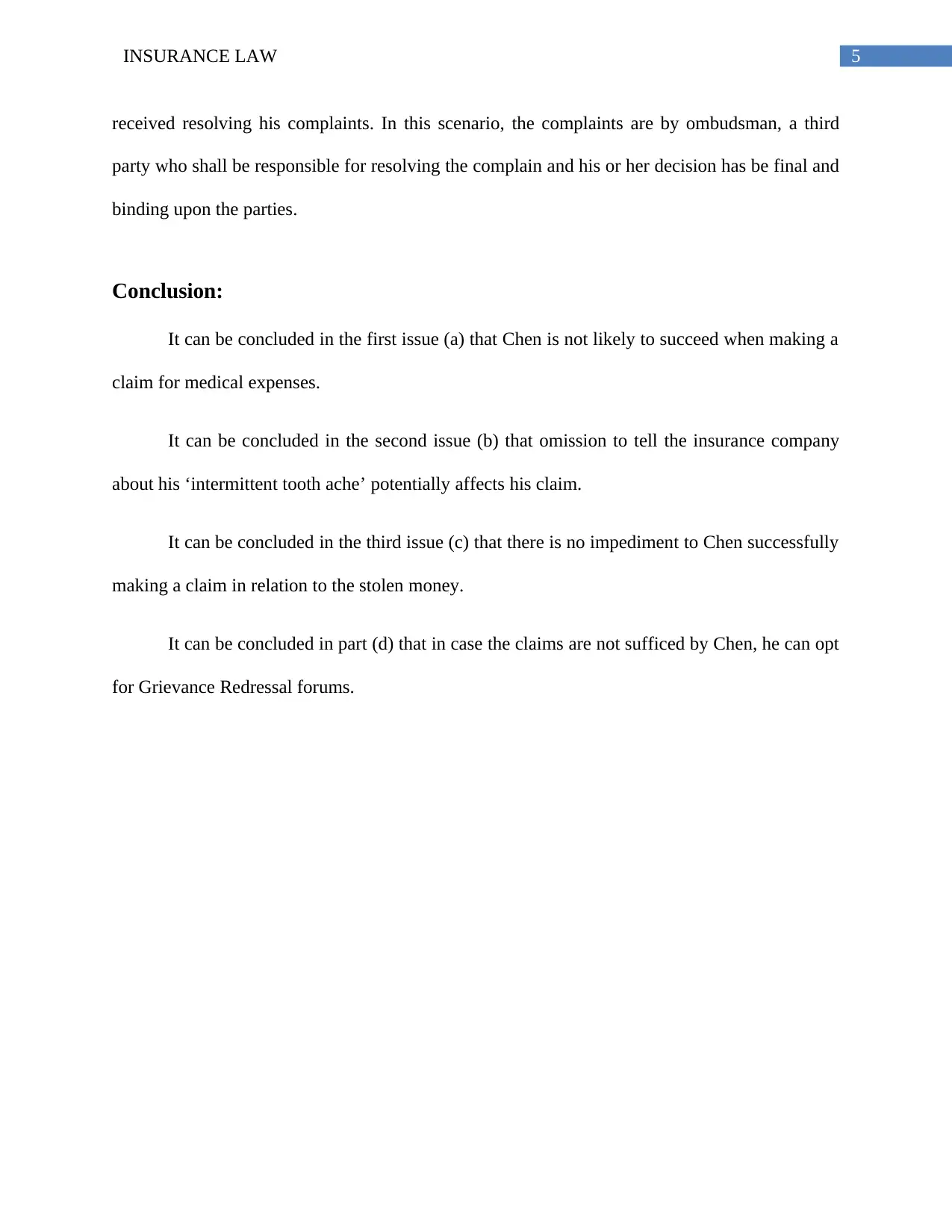
5INSURANCE LAW
received resolving his complaints. In this scenario, the complaints are by ombudsman, a third
party who shall be responsible for resolving the complain and his or her decision has be final and
binding upon the parties.
Conclusion:
It can be concluded in the first issue (a) that Chen is not likely to succeed when making a
claim for medical expenses.
It can be concluded in the second issue (b) that omission to tell the insurance company
about his ‘intermittent tooth ache’ potentially affects his claim.
It can be concluded in the third issue (c) that there is no impediment to Chen successfully
making a claim in relation to the stolen money.
It can be concluded in part (d) that in case the claims are not sufficed by Chen, he can opt
for Grievance Redressal forums.
received resolving his complaints. In this scenario, the complaints are by ombudsman, a third
party who shall be responsible for resolving the complain and his or her decision has be final and
binding upon the parties.
Conclusion:
It can be concluded in the first issue (a) that Chen is not likely to succeed when making a
claim for medical expenses.
It can be concluded in the second issue (b) that omission to tell the insurance company
about his ‘intermittent tooth ache’ potentially affects his claim.
It can be concluded in the third issue (c) that there is no impediment to Chen successfully
making a claim in relation to the stolen money.
It can be concluded in part (d) that in case the claims are not sufficed by Chen, he can opt
for Grievance Redressal forums.
⊘ This is a preview!⊘
Do you want full access?
Subscribe today to unlock all pages.

Trusted by 1+ million students worldwide
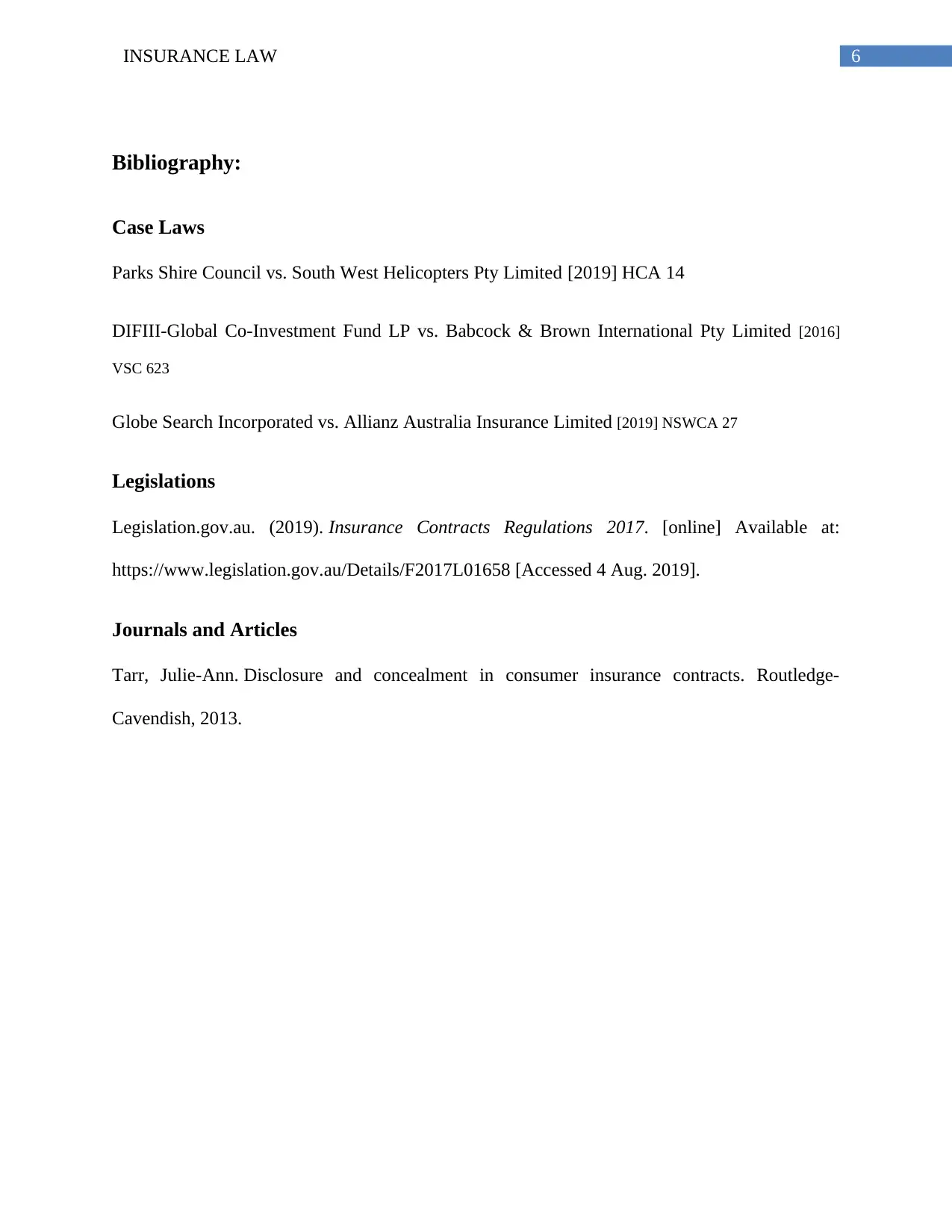
6INSURANCE LAW
Bibliography:
Case Laws
Parks Shire Council vs. South West Helicopters Pty Limited [2019] HCA 14
DIFIII-Global Co-Investment Fund LP vs. Babcock & Brown International Pty Limited [2016]
VSC 623
Globe Search Incorporated vs. Allianz Australia Insurance Limited [2019] NSWCA 27
Legislations
Legislation.gov.au. (2019). Insurance Contracts Regulations 2017. [online] Available at:
https://www.legislation.gov.au/Details/F2017L01658 [Accessed 4 Aug. 2019].
Journals and Articles
Tarr, Julie-Ann. Disclosure and concealment in consumer insurance contracts. Routledge-
Cavendish, 2013.
Bibliography:
Case Laws
Parks Shire Council vs. South West Helicopters Pty Limited [2019] HCA 14
DIFIII-Global Co-Investment Fund LP vs. Babcock & Brown International Pty Limited [2016]
VSC 623
Globe Search Incorporated vs. Allianz Australia Insurance Limited [2019] NSWCA 27
Legislations
Legislation.gov.au. (2019). Insurance Contracts Regulations 2017. [online] Available at:
https://www.legislation.gov.au/Details/F2017L01658 [Accessed 4 Aug. 2019].
Journals and Articles
Tarr, Julie-Ann. Disclosure and concealment in consumer insurance contracts. Routledge-
Cavendish, 2013.
1 out of 7
Your All-in-One AI-Powered Toolkit for Academic Success.
+13062052269
info@desklib.com
Available 24*7 on WhatsApp / Email
![[object Object]](/_next/static/media/star-bottom.7253800d.svg)
Unlock your academic potential
Copyright © 2020–2026 A2Z Services. All Rights Reserved. Developed and managed by ZUCOL.

